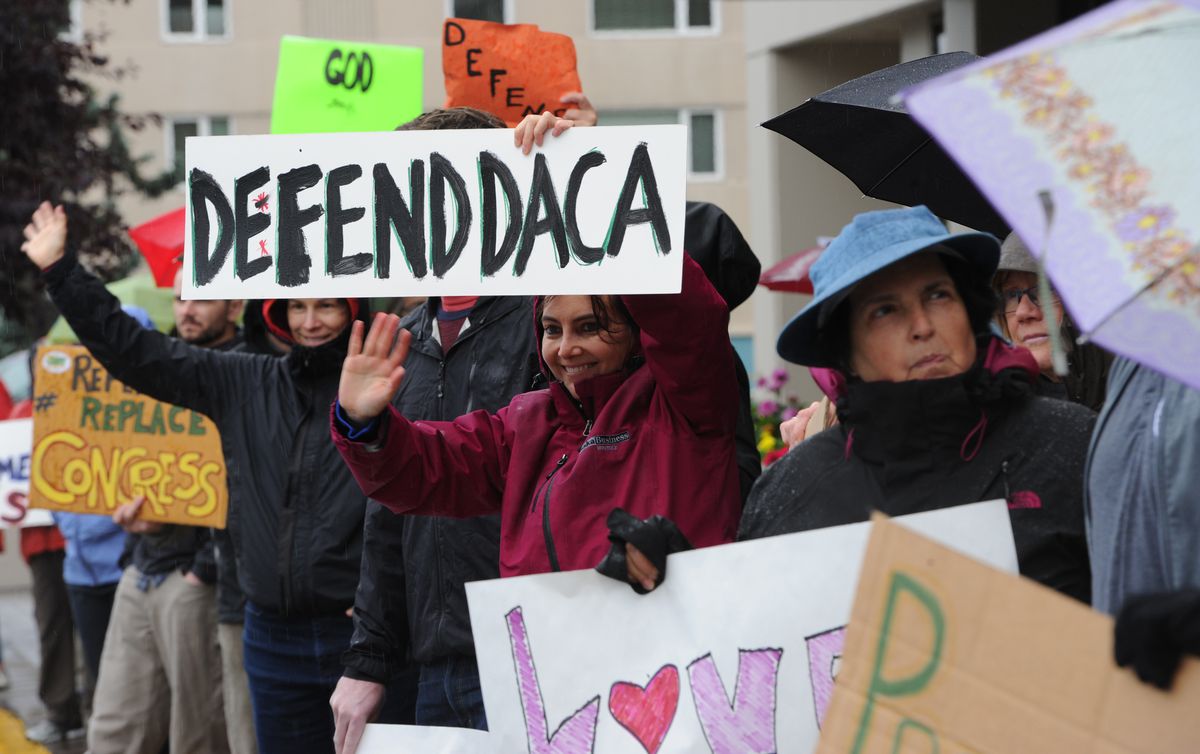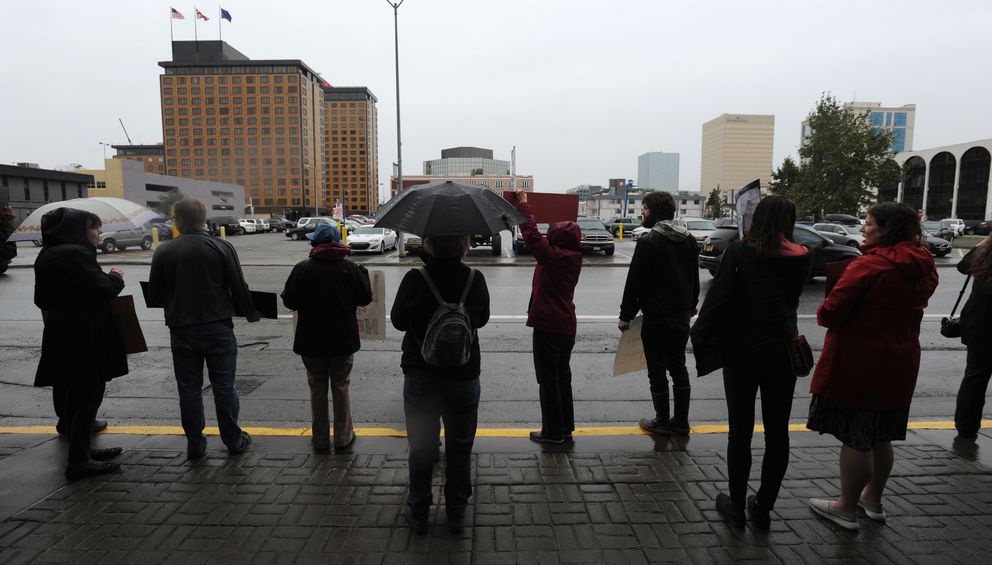With Trump ending DACA program, uncertainty looms for Alaska’s few ‘dreamers’

Compared to other states, Alaska has a tiny number of beneficiaries of the Deferred Action for Childhood Arrivals policy.
But Tuesday’s announcement that the Trump administration is moving to “wind down” the program known as DACA introduced new uncertainty to the lives of the 138 people who have been allowed to live and work in Alaska without fear of deportation through the program, immigration attorneys and advocates said.
The news was met with a rally in support of DACA in Anchorage and statements from members of Alaska’s congressional delegation.
Sen. Lisa Murkowski said in a statement Tuesday afternoon that she believes “we should not punish children for the actions of their parents.”
“I believe those who were brought to this country by their parents, raised here, educated here, lived here, and dreamed here, should be welcomed to stay here,” Murkowski said in the statement. “They should have the right to work and a path to citizenship.”
She said she was “ready to work with colleagues on both sides of the aisle” to “provide a legal, certain path forward for these children of our friends and neighbors.”
Responsibility of Congress
Rep. Don Young said in a statement that the Obama-era DACA decision “undermined the role of Congress and (was) in complete violation of the Constitution.”
Now that the Trump administration has overturned DACA, Young said he believes it’s the responsibility of Congress to “address our nation’s broken immigration system, including the legal status of those who were brought to our nation through no fault of their own.”
Sen. Dan Sullivan echoed Young’s complaint that DACA had been enacted without Congress and “likely exceeded” Obama’s constitutional authority.
Most DACA beneficiaries “are hardworking, law-abiding members of our communities, including hundreds in Alaska,” he said. “I intend to work with Republicans and Democrats to address these particular immigration cases through legislation both with compassion and a respect for the rule of law.”
DACA recipients in Alaska
Over half of the 800,000 people to benefit from DACA live in just four states: California, Illinois, New York and Texas, according to U.S. Citizenship and Immigration Services data.
In Alaska, 138 people living here have approved DACA status, according to March statistics from the U.S. Citizenship and Immigration Service. That’s more than Maine, Vermont, Montana, West Virginia and North Dakota.
The service has approved 419 renewals of the status here.
Many Alaska residents with DACA protection have been living in the United States since they were very young, said Lea McDermid, an immigration attorney in Anchorage.
“All of my clients who have DACA or who have applied entered as babies or very young children,” she said.
Her clients are now between 16 and 25. All originally come from Mexico. Many of them are now students, some holding part-time jobs to help support their families, McDermid said.
DACA has allowed her clients to get driver’s licenses and permission to work, she said.
She’d been talking to some of them Tuesday morning about the immediate impacts of the change, which includes an end to “advanced parole,” which allows DACA recipients to get permission to travel outside the country and return.
“A lot of them saw it coming”
The Department of Homeland Security has said no new DACA applications will be accepted after Tuesday, but people who already have a two-year work permit though the program can apply to renew it until Oct. 5.
In some cases, she’s advising clients that they have alternative paths to continue living in the United States.
“A lot of them saw it coming,” she said. “It’s not a huge shock.”
Margaret Stock, an immigration attorney at Cascadia Cross Border Law Group, also advises clients with DACA status.
She said she has DACA-recipient clients serving in the military at Joint Base Elmendorf-Richardson or married to military members.
Stock’s own paralegal assistant Hyun Jung Kim is one of Alaska’s DACA recipients.
Kim said she is originally from South Korea but came to Alaska in 2003 and attended high school here.
Not having legal status through DACA would make supporting herself difficult, Kim said.
Without it, “I can’t support my child. I can’t pay my rent. I can’t pay any of the bills.”
She considers Alaska home, she said.
“We’re talking about people who live in America and who’ve only known America as home.”
‘I was given my shot’

About 75 people staged a rally in support of DACA outside the Peterson Building on L Street in downtown Anchorage Tuesday. The building houses the offices of Sens. Lisa Murkowski and Dan Sullivan.
The group waved flags and banners in pouring rain as cars and trucks drove by on L Street, occasionally offering honks of support.
“I’m an immigrant,” said rally attendee E.J. David, who was born in the Philippines and moved to Utqiagvik as a teenager. “Similar to many DACA recipients, I came here to this country as a child. The only difference between me and the DACA recipients is I just happened to be lucky and have the proper documents.”
Having legal status made it possible for David to pursue his career, he said. He’s now a University of Alaska Anchorage psychology professor and community activist.
“I was given my shot as an immigrant,” he said. “I don’t think it’s right for other folks who I’m no more special than to not be given their own shot.”
Related stories from around the North:
Canada: Census 2016: Nunavut leads Canada’s population growth, Radio Canada International
Finland: Finland asylum seekers to march from Lapland border town into Sweden, Radio Sweden
Norway: Visa-free regime will strengthen special relationship with Russia, North Norwegian leaders say, The Independent Barents Observer
Sweden: Activists say use of Finnish in Sweden is being restricted, Yle News
Russia: Putin signs law easing cross-border cooperation with Norway and Finland, The Independent Barents Observer
United States: Gov. Walker signs bill recognizing the black soldiers who helped build the Alaska Highway, Alaska Public Media



